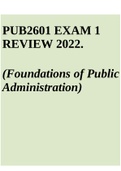PUB2601 EXAM 1
REVIEW 2022.
(Foundations of Public
Administration)
, Question 1
1. What do the John Locke and Thomas Hobbes theories of the social contract
have in common and how do they apply in South Africa?
1.1 The social contract
The idea of the social contract developed in Western thought as a means of
conceptualising the constitution of society: that is, the organisation of people into a
legitimate polis. For Thomas Hobbes – broadly recognised as the first theorist to
compose a full defence of social contract theory – the social contract named a
rational agreement between self-interested individuals to submit to a central
authority: the sovereign. This sovereign power would enforce a common law,
affording rights and bestowing certain duties upon its citizens. The social contract
arose decisively from what Hobbes termed a State of Nature – a hypothetical pre-
social and pre-political condition where individuals pursued their prerogatives to the
point of violence, destruction and utter immorality. This ‘State of Nature’ is the
essential precondition which makes necessary the social contract. In short, without a
warlike State of Nature there would be no rational need for a social contract. This is
Hobbes’s theory of the justification of the state.
1.2 Comparison
The social contract, as theorized by Hobbes, Locke, and Rousseau, is an agreement
between citizens to form an organized society which relies on the right to secure
mutual protection and security. This agreement legitimizes the authority of national
governments over certain aspects of citizen’s lives, but also relates to other
overarching institutions such as the African Union. A key condition of a functioning
social contract is that citizens partially surrender their individual rights and adhere to
said contract to maintain social order. This social order allows individuals to obtain
prosperity, one that is possible with others rather than alone. Furthermore, security
refers both to physical security as well as identity security. When a government can
successfully provide both prosperity and security to a citizen, the social contract is
fulfilled. This is highlighted in the Preamble to the 1996 South African Constitution
1.3 The social contract in South Africa within South Africa
When the South African Constitution was adopted in 1996, it was imagined to
represent a new social contract between all the people of South Africa. In this
context, the term ‘social contract’ can be broadly understood as referring to an
implicit agreement between the people to establish a new South African society,
founded on the values of universal suffrage, equality, inclusivity, and democracy,
designed to benefit all.
The Constitution of the Republic of South Africa (Act 108 of 1996) stands as a
symbol of the post-apartheid social contract (National Planning Commission (NPC)
2015). As a social contract, South Africa’s constitution is widely considered to be
progressive. Firstly, it enshrines an expansive bill of rights, including civil and political
rights, socio-economic rights – such as the right to social security, water, sanitation,
and food – and a fundamental right to human dignity. Moreover, the South African
This study source was downloaded by 100000837854628 from CourseHero.com on 04-21-2022 13:17:39 GMT -05:00
https://www.coursehero.com/file/95502218/PUB2601-EXAM-1pdf/




